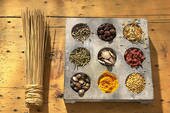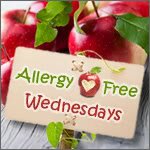Crohn’s disease (CD) is an inflammatory bowel disorder of unknown origin. Also called ileitis or enteritis, it usually affects the lowest portion of the small intestine, but it can occur in other parts of the digestive tract from the mouth to the anus. Crohn’s causes inflammation that extends deep into the lining of the intestinal wall, frequently causing significant abdominal pain, diarrhea, rectal bleeding, loss of appetite, and weight loss.
(Below I’ve provided links to the products I use or have used.
I don’t purchase any of these products online,as I’m able to find them locally at my Natural Foods Coop).
Probiotics this one or this one (use as directed on label)Benefits: Aids in digestion. Use a nondairy formula. And a product containing both L. acidophilus and L. bifidus is best.
Please review and study each herb carefully before taking and be mindful of side effects. Never take herbs while pregnant or breastfeeding, unless directed by your holistic healer or medical practitioner!
(click on each herb for more information)
(do not use any other form)
~Information About Diet and Prescription Medication for Crohn’s Disease~
_________________________________________________________________
Thank you for joining me today for day 2 of our Herbs and Spices Summer Series!
Shared on: Traditional Tuesdays, Gluten Free Wednesdays,














This is a very informative post Amber, I love the healing recommendations you have outlined because I firmly believe they are correct!
Do you think that any of the supplements has particularly helped you combat Crohn’s?
When my son was healing, he didn’t take any supplements even though we bought (and imported) SCD legal ones from Lucy’s Kitchen Shop. I notice she has a much bigger selection now.
Also I’m curious about the protein fact – why do sufferers of IBD require more protein? I’m going to google search this. Very interesting!
Thank you for all the work that you have done for this post! I shall now go and explore further!
Thanks Vicky!
I do believe the supplements help me! I rely on fish oils, probiotics, and vitamins. I take things such as NAG, L-Glut, etc. as needed and always during a flare. And I rotate all those herbs mentioned above.
I don’t know specifically why we need more protein, but it must have to do with healing.
Let me know what you find out.
It’s funny you should mention about the protein. My son and I were having a discussion about this last year because I was worried he wasn’t getting enough. His own studies at University (biology, neurology, chemistry) made him aware that it wasn’t necessary to consume the amount recommended.
Although many medical experts believe that protein is important to heal Crohn’s our experience has been the complete opposite!
But then, I’m no medical expert. Thank you for the information about the supplements you use, I think it will be very helpful for others!
hey Amber! What a great post! This took a lot of work with all the links and info — THANK YOU — it is greatly appreciated –especially the list of SCD foods. I’m continuing to consider switching to this approach. The protein is so important during healing. My doc said i should aim for 100g a day! yikes! I learned so much from this post and am going to implement some of these herbs and supplements into my healing plan. Have a great weekend! hugs!
Hi Caralyn,
I’m so glad you found some things helpful in this post!
Let me know if you have any questions about SCD. I’ve been studying if for several months now and plan on starting in next month.
Hi thanks for the detailed post.
Two things I would like to share, vitamin D is also very important for controlling inflammation. Following a Crohn’s attack my physician informed me I was severely Vit D deficient and prescribed an injection I believe it has made a large difference in my digestive health. Also I would like to caution everyone to follow new diets very carefully. I tried the GAPS diet and suffered a severe Crohn’s exacerbation leading to hospitalization while I was on the intro diet.
happy healing everyone!
Hi Nel,
I can’t thank you enough for your input.
First, great suggestion and insight about the Vit. D. I will look into this myself.
And I completely agree about the diets. Thank you for sharing, and I’m so sorry to hear about your hospitalization. Yikes. One thing I don’t eat on SCD is dairy. But I have noticed that it’s been helpful so far. I haven’t started it 100% yet, but I will be sure to share my experience when I do. I always have doubts about one size fits all diets. We all have such unique needs.
One thing I was looking into was metabolic typing. We’ll see. So much out there. My goal is to find a healing food regimen that I can stick with that’s easy and truly healing.
Thanks again Nel!
That is my favorite healing book too! I used it extensively when healing from Celiac Disease – it was a “god send” !
I can’t agree more Ina! This book is amazing and so helpful! I love it too.
wow..wat a fantastic post..
new to your space..
happy following you..:)
do stop by mine sometime
Tasty Appetite
Thanks Jay. Will do.
This is an absolutely fantastic post Amber! It is jam packed with helpful and important information that I will be sharing with others I know locally who suffer from Crohn’s Disease. I bet my husband who has celiac could also benefit from many of the nutritional supplements you mentioned. I can’t wait to read more of your upcoming posts!
Thanks Laura! I’ve been meaning to create this post for months. So glad it can be a part of this series.
I did do a holistic healing for celiac disease from the same book. Lots of good information in there that might be of interest to your husband: https://thetastyalternative.com/2011/09/holistic-healing-for-celiac-disease_24.html